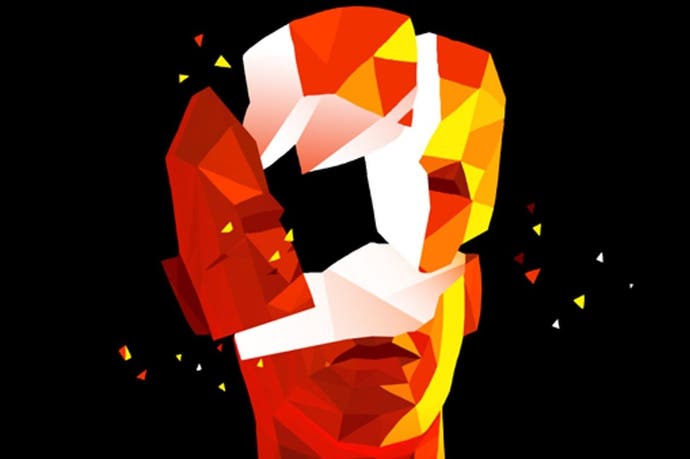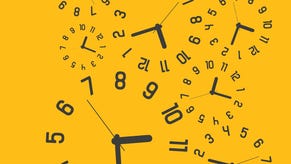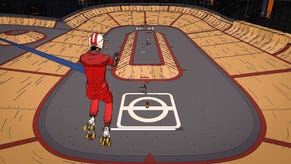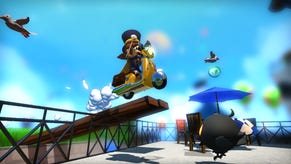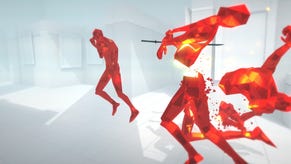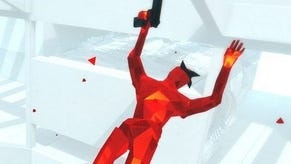In Play: There's a kind of diversity that games excel at
Scattershooting in Superhot, Far Cry Primal and the rest of this week's releases.
In Play is a column taking a weekly sideways look at new game releases. It's a bit like our old series Game of the Week, if you remember that.
There are weeks when you look at the new releases and think that video game developers and publishers are doing a pretty good job. This is one of those weeks. Not because the games are spectacularly great - though they're all at least decent - but because of the sheer breadth of what's on offer.
Games have always been incredibly diverse in design, and this lot's no different: a high-concept arcade game, a sprawling action adventure, a multiplayer romp, a survival challenge and a story-minded role-player. That's cool, but it's also par for the course. What's more out of character - and encouraging - is the thematic and aesthetic breadth on display. Flimic cavemen. Family slapstick. J-pop fantasy. A sort of melancholy, post-apocalyptic southern Gothic. Indie minimalism and retro chic. As UK garage's philosopher-king Craig David so penetratingly put it: what's your flava? (He was singing about ice cream as a metaphor for sexual partners, but you get my point.)
During the last couple of years, gaming has gone through some very public and agonised growing pains over its style and content. There's been hand-wringing from either end of the political spectrum about diversity, and underlying that a submerged worry about a medium that seemed to have reached adulthood, but not maturity - that couldn't let go of its rejection of the real world and unthinking embrace of stereotyped genre material. As awful as it's been for everyone who cares about video games, at times, this is an important process that we all have to through for the medium to develop. But it has also slightly and unfairly obscured just how far we've come.
Whatever you think of Ubisoft, it has always had an enviable willingness to take thematic risks - both on new properties, and with its most treasured ones. This, after all, is the company that, in Assassin's Creed, created a multimillion-dollar entertainment franchise that is fundamentally a history geek-out. With this week's Far Cry Primal, it playfully relocates Far Cry's free-roaming wilderness action to the Mesolithic period, 10,000 years ago.
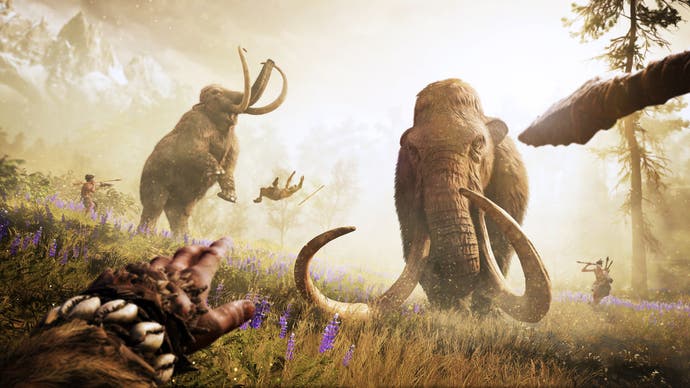
The problem, as ever with Ubisoft, is that adventurous creative direction goes hand-in-hand with deeply conservative, not to say rote, game design. As Edwin put it in our Far Cry Primal review: "However far-flung the scenario, frame it in your mind and I'll make you a promise: Ubisoft is there. Ubisoft has always been there. Waiting for you, with a sackful of fast travel points and upgrade materials, pop-up escort missions and fluidly chaining takedowns.
If Far Cry Primal is proof of anything it's that there is no epoch that can't be translated into the affable lingo of the Ubisoft open-worlder, give or take the odd period idiom. The 'explore, destroy, colonise' rhythms of previous Far Cries settle into place around this one's Stone Age premise like a white blood cell engulfing an exotic bacterium. What, were you expecting a mere 10,000 years to really change anything, other than the names we give to things like grenades, grappling hooks and throwing knives? Ha ha ha! It is already too late."
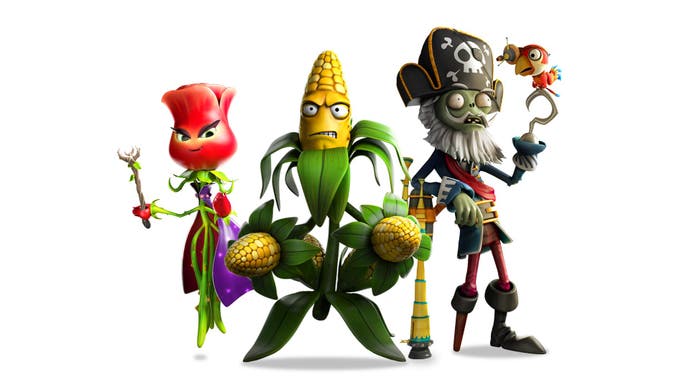
So it's just a palette swap, in other words. But sometimes even a palette swap can be meaningful. Just ask Nintendo, which has found notable success by taking the online shooter into a new idiom that's about as far from Counter-Strike and Call of Duty as you can get: harmless, kid-friendly, cartoon fun. In fact, EA and PopCap were there first. This week's Plants vs Zombies: Garden Warfare 2, the sequel to its toothsome deathmatch take on the jolly tower defence hit, carries on the tradition. It may not have the invention or poise of Splatoon, and it has balance issues, but it's "a deeper, more satisfying and more consistently entertaining game than Star Wars Battlefront", in Jon Denton's words. More to the point, there's something about moving a familiar gametype to an unfamiliar arena - harmless and comical and imaginatively unfettered - that really picks out what's important about it, as well as offering the designers more freedom in areas like class design. (Also, it's not quite inviting kids to pretend to kill each other.)
Bravely Second seems like much more traditional fare - and it largely is. It's an unapologetic, classic Japanese RPG through and through. But this is a genre that always had a bit more going on than you might think. Often ridiculed for their stylistic peccadilloes and corny tropes, JRPGs have long been willing to go off the reservation when it comes to their side-quests, and get all sociological on our asses. Bravely Second belongs to that tradition. Cassandra opens our review with the story of a fight over the rights to a song, and a debate over preserving art or modernising it:
"Bravely Second is a lot of this. Good-hearted camaraderie interlaced with sprawling battles, silliness balanced with meditations on ethical behaviour, a dollop of drama, and an overarching sense of kindness. Bravely Second is kind. The characters are kind. No one really wants to hurt anyone else, they're all trying to preserve what they believe is the best way to be good to the people who matter, and that's both oddly twee yet strangely satisfying. I think it's because JRPGs always seem fixated with dire circumstances, while Bravely Second feels more like a case of people who can't agree on how best to be nice."
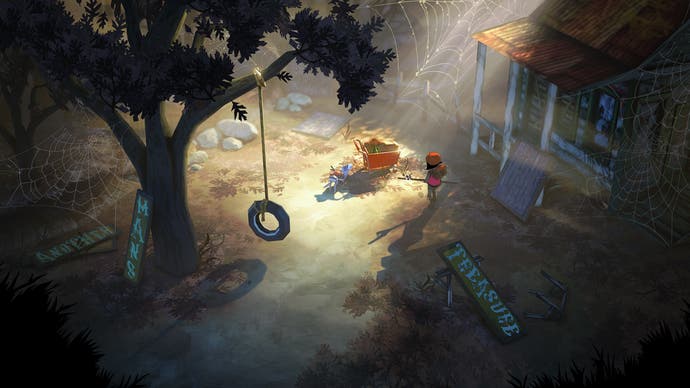
A game without an absolutist moral worldview? That seems notable in itself. Of course, there is one game genre that tends naturally towards ambiguous amorality, and it's one that, in these tough economic times, couldn't be more popular: survival. So The Flame in the Flood relocating survival rogue-lite to a post-apocalyptic world reminiscent of Depression-era America is just joining the dots, right? But wait, there's more. The crucial element of the setting is that it's on a river, and the endless movement of the river journey - as well as recalling such classic works of tough-luck Americana as Huckleberry Finn and The Night of the Hunter - is a game-changer. "It's brilliant, really: a survival game where you're actually going somewhere," wrote Christian in our review. "Where there's no house to build and no farmland to grind. Each procedurally-offered patch of land in The Flame in the Flood is finite, with resources that will not replenish, and opportunities that you might not see again. Your job is to make the most of it and know when to move on."
I love this, when a game's theme and design mesh just so, the one reinforcing the other. But it's not always this way. Sometimes it's more of a struggle between them, but sometimes that struggle becomes something fascinating in its own right. So it is with the magnificent Superhot.
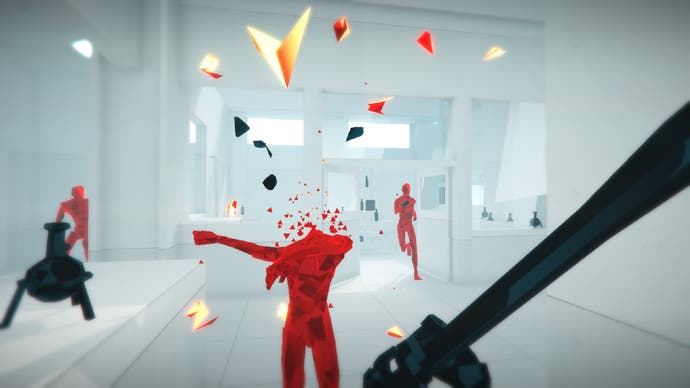
Superhot is an incredibly simple and clever pitch: the shooter where time only moves when you do. It turns an incredibly fast-paced and brutal action game, not unlike Hotline Miami, into a ruminative tactical poser, and its rhythms are unique and compelling. It's also, for all its glassy abstraction, compellingly violent: a game that is very much about enjoying a simulation of killing lots of people. Far from gloss over this, the developers meet it head on.
"Superhot's too witty and thrilling to be a cold treatise on digital slaughter, and too disturbing and acute to be the mindless blaster that it is so good at subverting," wrote Christian (that guy again) in our review. "Like Manhunt - another great game I never want to play again - this is that rare piece of charmingly curated violence that dares to provoke difficult thoughts."
Yes, it's rare, but it's getting less rare with every year, every month, every week. Video games are (re)learning how to experiment. Is it a contradiction that this week we can buy, and legitimately enjoy, one game that takes shooting back to a world where you have to run over and pick up your spear after each shot, one that turns it into a family-friendly nerf war, and one that seeks to deconstruct its physical and moral dimensions completely? Yes. It's a brilliant one.
